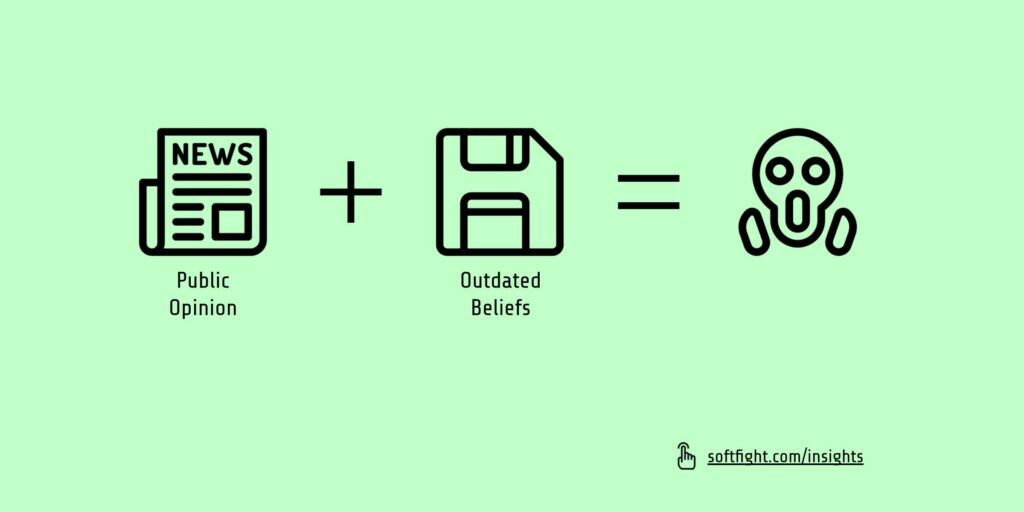If you sell software development services, you will not find your competition if you search on Google. Fear is your toughest competitor.

When competition is good
The human mind is generally a competitive mind. In some industries, this has led to some famous and entertaining public rivalries:
- Mac vs PC
- Nike vs Adidas
- Coca-Cola vs Pepsi
It’s entertaining for all of us, especially when they are expressed in advertising campaigns.
It also serves as a very effective way to motivate employees internally (search for “Crush Adidas”).
In many cases, it’s just a good strategy decision for the underdog.
It’s only natural that every entrepreneur of a software development company feels that they are also playing a similar competition game.
The consequence of this is visible in many aspects of their business:
- How much should we pay our employees? Let’s see what the salaries are on the market and use that as a reference.
- What percentage of our revenues should go to marketing and sales efforts? Let’s see what other companies are spending and use that as a reference.
- How much should we charge for our services? Let’s … you get the drill.
- How are other software companies pricing their services? Daily rates? We should also do that, there is no other way to price.
This makes sense.
Sometimes.
On some level.
But it’s much, much less often than you would think.
Which competition?
If you are selling Java Software Development services, there are 5.445 companies listed on Clutch.
For NodeJS Development, there are 5.546.
And these are just the companies listed on one platform. Imagine how many others are out there in the world that did not bother to list on Clutch or don’t know this is a possibility.
Can we safely assume there are at least 5 others for each one listed? Or 7? Maybe even 10?
When you are preparing a project proposal for a new prospective customer and think about the competition, who are you thinking of? Which of these tens of thousands of “competitors” are you fighting against?
Ideally, the potential customer told you who are the other companies who will submit a proposal? Highly unlikely. Yes, I am also laughing when I am writing this.
Maybe you have skilled sales people and you were able to extract some information. You might know that one other team bidding for the same project is from Poland and two are from Ukraine. Maybe there are others, you don’t know for sure.
Even if you would somehow learn their names, what would this tell you? Would you be able to predict how much they are going to charge for this particular project? Or how many team members can they assign to it at a particular moment in time? Most probably not.
Why does this matter?
The point I’m trying to make here is that most of the efforts and energy spent on competing against other companies would be much better spent elsewhere.
What you are competing against is:
- The Expectations, Needs and Fears of the prospective customer’s team doing the supplier evaluation
- The undisciplined, emotional version of yourself
The better you understand what your customer is looking for, what they value, how much they are willing and able to pay, the higher your chances of being successful in your bid to win the project.
To have this understanding, significant time and effort needs to be spent. Both in the strategic exercises when you choose your target customer segments, your offering focus and your pricing model. And for each individual project, when you are creating the proposal.
As for discipline and emotions, it’s a very simple algorithm.
More discipline.
Less emotions.
For example, you might find that it’s best to not share your rate card with anyone asking a simple question, but to only give pricing information after you know more details about the project.
If you have decided that the sales process is best managed in a certain way, then everybody involved from your team needs to be disciplined and actually do it like that.
What about emotions? One word: discounts. How much do these cost your company? Are you tracking this? Most services companies don’t.
There are so many ways in which emotions triggered at the wrong time, in the wrong place lead to suboptimal results in sales and pricing.
How much do emotions interfering with your sales process cost you in lost revenues every year?

